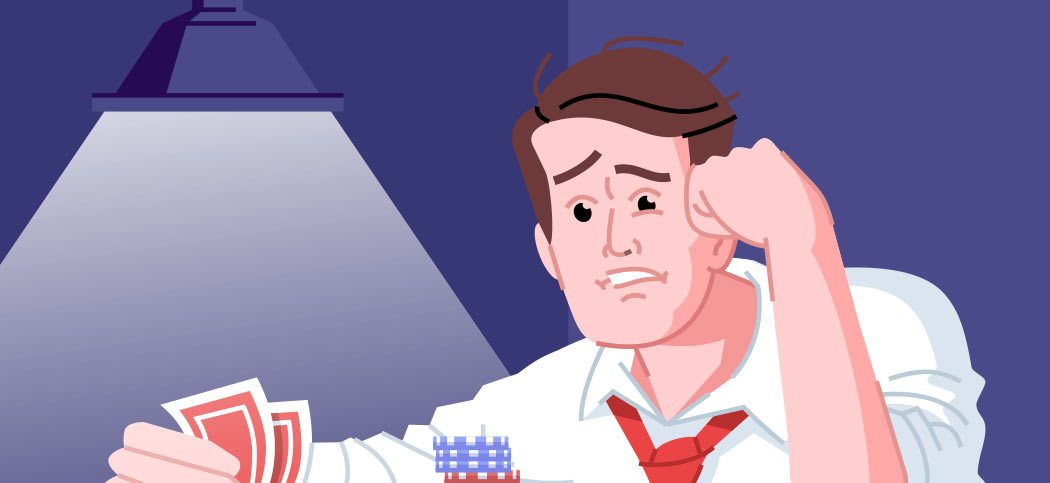Early Signs of a Developing Gambling Problem

Gambling can be a fun recreational activity, but for some, it can become problematic and lead to financial and personal issues. Being aware of the early warning signs of a gambling problem is important. It allows you to take action before things spiral out of control. In this article we’ll help you conduct a self-assessment to find out whether you’re displaying any early signs, and explain what to do if you are.
Advertiser Disclosure
By accessing and depositing through our provided links, we may receive a commission at no extra cost to you. Learn More.
✖How We Rank Casino Bonuses using BonusRank
Not just any online casino makes the grade. We have a strict process for testing online casinos to determine whether we even list them.
Once we approve a casino, our team of experts starts the real work. And it's thorough. Our unique BonusRank algorithm considers all the important aspects of a bonus and calculates a score that allows meaningful and direct comparison between bonuses. You don't have to guess, our rating scale will clearly show you if a bonus is great, good enough, or should be avoided.
Read more about our BonusRank system and how we make bonus comparisons.
✖If you’re not the one with a gambling problem, then this might not be the right source of information.
Stepping in to help someone with a developing gambling problem requires a different set of skills. We can guide you through the process of supporting a friend or loved one.
Why Does Gambling Addiction Develop?
If you’re new to real money betting, it might be a good idea to read up on a few responsible gambling steps to ensure you maintain a healthy mindset while playing.
For most, gambling will simply remain an enjoyable and occasional past time, but for others a single event can spell the beginning of a gambling problem.
There are several factors that can lead a recreational gambler down the path of addiction.
The "Near Miss" Phenomenon
Slot machines and other games are designed to produce near wins and near misses frequently. This gives players an illusory feeling of control. The rush of almost winning reinforces the gambling behavior.
The Casino Environment
Casinos create an immersive environment with no clocks, free drinks, and constant sound/light effects. This distracts from rational thinking and encourages continued gambling.
Chasing Losses
After losing, many gamblers feel compelled to keep playing to win back their money. This strategy is often paired with bigger bets. But this usually leads to even bigger losses.
It’s not hard to understand how this thought process comes about. A single larger bet that comes good can cover the losses of several smaller bets - but this is in no way guaranteed.
Underlying Mental Health Issues
For some, gambling provides an escape from or way to cope with depression, anxiety, trauma, or boredom. This form of self-medication can lead to addiction.
Genetics
Research suggests genetics may play a role. People with parents who have a gambling problem are more likely to develop one themselves.
Recreational Gambling Vs Problem Gambling
There are distinct differences between gambling purely for entertainment and gambling that has become an unhealthy compulsion. In the very early stages, the signs can appear harmless and much harder to spot.
As a baseline in safety, we always recommend playing at reputable casinos with strong responsible gambling ethics, but it’s not always enough.
| Recreational Gambling | Problem Gambling |
|---|---|
| You gamble for fun and entertainment, not as a source of income | You gamble to make money or recoup losses |
| You set a budget beforehand and sticking to it | You gamble with money needed for other purposes |
| You accept losses as part of the game | You chase losses, taking ever increasing financial risks to win back money |
| You balance gambling with other hobbies and interests | You’re preoccupied with gambling and obtaining money to gamble |
| You don’t gamble when you’re depressed, bored, or upset | You use gambling to cope with difficult feelings |
| You see it as just one of many entertainment options | You prioritize gambling above work, relationships, and health |
| You can easily walk away and have a ‘take it or leave it’ approach to gambling | You’ve experienced repeated failed attempts to cut back on gambling |
The key is to catch problem gambling early before it causes significant harm. If gambling starts impacting other areas of your life, take it seriously.
How Gambling Begins To Negatively Impact Your Daily Life
In the early stages of gambling addiction you might begin to notice a series of events taking place in your daily life. These a indicators that your gambling activity has become problematic, and these events will begin to take a toll on your daily functioning and quality of life.
Let’s take a look at a few behavioral issues you might notice.
- Declining Performance at Work - You may have trouble focusing on your job, miss workdays, or face reprimand for reduced productivity. Coworkers or your boss may notice the change.
- Loss of Interest in Hobbies - Activities and hobbies you once enjoyed now hold little appeal. You'd rather spend your free time gambling.
- Disconnecting from Friends and Family - You start avoiding social gatherings, feeling unable to relate to loved ones due to preoccupation with gambling.
- Changes in Sleep Patterns - Obsession over past or future gambling interferes with your ability to sleep properly at night. Or, you stay up later gambling.
- Poorer Hygiene and Self-Care - You neglect basic self-care like bathing, laundry, healthy meals, and housecleaning. Gambling becomes your main priority.
- ‘Chasing Losses' Persists - You gamble not for fun anymore, but solely to try to win back all the money you've lost. But the hole keeps getting deeper.
If gambling consumes your thoughts, time, and resources to the detriment of the rest of your life, it's harmful. Don't wait for rock bottom before seeking help.
Signs That Your Gambling Has Become Unhealthy
There are a number of things to look out for, but it’s not always the same for everyone. Depending on your lifestyle and personality, the signs of gambling addiction will vary from person to person.
That being said, there are a few common signs that might feel familiar:
You're Spending More Money Than Intended
One of the clearest signs of a budding gambling problem is spending more money than you can afford to lose.
This could involve:
- Repeatedly exceeding your gambling budget
- Using household money, like rent or grocery money, to gamble
- Maxing out credit cards or getting cash advances to finance gambling
If you find you consistently lose track of how much you've spent gambling, that's a red flag. Healthy gambling means setting a budget and sticking to it.
You're Hiding Your Gambling From Loved Ones
Many gamblers conceal or downplay their gambling habits from close friends and family members. This is often because they know their gambling behavior is excessive or feel ashamed about it.
If you catch yourself lying to loved ones about your gambling or how much money you've lost, it likely signals an unhealthy relationship with gambling.
Your Gambling Causes Emotional Distress
For problem gamblers, gambling is less about entertainment and more about numbing difficult emotions or chasing losses.
Signs of this include gambling when you're:
- Feeling depressed or anxious
- Lonely or bored
- After having an argument with a loved one
- Gambling to cope with or "tune out" negative emotions is a warning sign of unhealthy gambling habits.
You're Borrowing Money to Gamble
When gambling becomes an addiction, some will borrow or even steal money to keep gambling.
Warning signs of this include:
- Taking out payday loans or cash advances on your credit card specifically for gambling.
- Borrowing money from family, friends, or your workplace to cover gambling losses.
- Selling or pawning personal items to get money to gamble.
Relying on borrowed money to fund gambling you can't afford is not sustainable. It often leads to larger debt and financial trouble.
Your Work or Personal Life is Suffering
Problematic gambling can negatively impact important areas of life, like your job, relationships, or health.
Signs of this include:
- Missing work due to being at a casino
- Arguments with loved ones over gambling
- Declining performance at work or school
- Neglecting your health and hygiene
If gambling is interfering with work, family life, or your health, it's important to reevaluate your gambling habits.
Problem gamblers are often in denial, easily finding ways to justify their behavior.
Keep in mind that although you might not fit the bill for every single sign of gambling addiction, it doesn’t mean that you don’t have a problem.
What You Can Do If You Identify Signs Of A Gambling Problem
Gambling addiction is treatable, and problem gambling that’s identified early even more so.
You’re on the right track, and here are some more positive steps you can take:
- Be honest with yourself and loved ones about the extent of your gambling
- Set a firm budget for gambling and stick to it
- Avoid places and situations that trigger the urge to gamble
- Learn to manage difficult emotions in healthy ways besides gambling
- Seek support through counseling, therapy, Gamblers Anonymous meetings, or reputable online resources
Gambling Addiction Statistics
Finding out that you’re exhibiting early signs of a gambling problem can be worrisome. But the fact that you’ve admitted it is the first step. Many individuals are going through the same thing.
- It's estimated 1-3% of adults in the U.S. have a gambling addiction. Many more struggle with problem gambling.
- Young adults aged 18-29 have higher rates of problem gambling than older adults.
- Men tend to have higher rates of problem gambling compared to women.
- Veterans and active military personnel are at increased risk for problem gambling.
The good news is that problem gambling is treatable. But overcoming it requires honesty, lifestyle changes, and sticking to boundaries. With the right help and support system, it's possible to regain control over gambling and repair the negative impacts it has caused.
Your Next Steps
Being aware that you have a problem is the first step, but it’s not the end of the road. Your next job is to get onto the road to recovery. We strongly suggest you surround yourself with positive and supportive role models.
These individuals will be crucial to your success and you begin treating your gambling problem. We promise, you’re on the right track!
Resources For Help
For more information about problem gambling, please refer to the following organizations:
| Organization | Website | Phone | |
|---|---|---|---|
| Multiple Jurisdictions | |||
| Gambler’s Anonymous | www.gamblersanonymous.org | Check website | Check website |
| Gambling Therapy | www.gamblingtherapy.org | [email protected] | Check website |
| USA | |||
| National Council on Problem Gambling | www.ncpgambling.org | [email protected] | 1-800-522-4700 |
| UK | |||
| GamCare | www.gamcare.org.uk | Check website | 0808 8020 133 |
| Australia | |||
| Gambling Help Online | www.gamblinghelponline.org.au | Check website | 1800 858 858 |
| New Zealand | |||
| The Problem Gambling Foundation of New Zealand | www.pgf.nz | Check website | Check website |
| South Africa | |||
| South African Responsible Gambling Foundation | responsiblegambling.org.za | [email protected] | 0800 006 008 |
| Canada | |||
| Centre for Addiction and Mental Health | www.camh.ca | Check website | Check website |
Sources
- American Psychiatric Association. (2013). Diagnostic and statistical manual of mental disorders (5th ed.) - https://doi.org/10.1176/appi.books.9780890425596
- Cowlishaw, S., Merkouris, S., Chapman, A., & Radermacher, H. (2014). Pathological and problem gambling in substance use treatment: A systematic review and meta-analysis. Journal of Substance Abuse Treatment, 46(2), 98-105 - https://doi.org/10.1016/j.jsat.2013.08.019
- Gamblers Anonymous. (2021). Questions and answers about gambling addiction - https://gamblersanonymous.org/ga/content/questions-answers-about-gamblers-anonymous
- Granero, R., Penelo, E., Stinchfield, R., Fernandez-Aranda, F., Aymami, N., Gomez-Pena, M., Moragas, L., Gunnard, K., Menchon, J. M., & Jimenez-Murcia, S. (2014). Contribution of illegal acts to problem and pathological gambling in adolescents. Journal of Gambling Studies, 30(4), 851–864 - https://www.ncbi.nlm.nih.gov/pmc/articles/PMC2945873/
- Petry, N. M., & Weiss, L. (2009). Social support is associated with gambling treatment outcomes in pathological gamblers. The American Journal on Addictions, 18(5), 402–408 - https://psycnet.apa.org/record/2010-03591-010
- Potenza M. N. (2014). Non-substance addictive behaviors in the context of DSM-5. Addictive behaviors, 39(1), 1–2 - https://doi.org/10.1016/j.addbeh.2013.09.004
- Slutske, W. S., Zhu, G., Meier, M. H., & Martin, N. G. (2010). Genetic and environmental influences on disordered gambling in men and women. Archives of general psychiatry, 67(6), 624–630. https://doi.org/10.1001/archgenpsychiatry.2010.51

